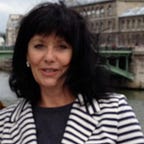From Dead-End Individualism to A Social Tipping Point
When I was doing my doctoral work in adult development in the early 1990s, adulthood was understood as attaining personal stability and being able to care for others, as well as to contribute to society. Now more and more of us caring adults are noticing that this seems not to be enough because rising food and energy prices, loss of livelihoods, climate change, environmental degradation, war, and critical gaps in healthcare, to name a few of the problems we face, reveal a failing political, financial, economic, and social architecture.
In this context, we ask ourselves what a responsible adult can do.
Living in a technological civilization has accustomed us to look for quick fixes, yet the question above is too multifaceted for an easy resolution. We are challenged to pause and think deeply about the roots of this global condition. How did we ever get to a planet on which abundance and comfortable lifestyles, and exorbitant wealth, exist in parallel with abject poverty, hunger and suffering of millions of children? The usual answer is ‘it’s always been that way; it’s human nature; I can’t do much about that…’
But is this really true? Or is it the story that has been told to us over and over to rationalize centuries-old systems of domination based on greed?
When we begin to connect the dots between our private daily lives and the greater reality we are living, we may notice that our commodified existence, normalized by a culture of materialism and deepening disconnect, leaves us numb and unsatisfied. We are weary of corporate greed and corruption, of institutions of governance that are profoundly disconnected from real care for human wellbeing. Yet we participate in reproducing this failing system by not questioning our consumption habits, nor our social beliefs about what is ‘realistic’.
The greater reality, which we are too lulled and distracted to fully recognize, is that the same bounties of industrialism and materialism which have allowed us to develop remarkable skills in every sphere of human activity, have also fed greed, ruthlessness, an extraction mentality that brutalizes the planet and socially vulnerable people, and has essentially run amok. This reality also requires us to recognize that the idea of unlimited growth and consumption is utterly unrealistic, and that we have to learn to live within planetary boundaries — something that corporate greed manages to continue to pay only lip service to. We, so-called adults, have quietly supported the story that life is about competition, about getting ahead and leaving others in the dust, even as our hearts and souls know otherwise — but we have told ourselves that these inner urges are ‘unrealistic’. Interestingly, the supposedly realistic approach to life — an extractive economics, pillaging the global commons like air, oceans, rivers, forests, and everything on which balance on earth depends, in order to consume more and feed the illusion of independence from one another — has turned out to be utterly unrealistic relative to planetary boundaries, as well as to our humanity.
The economic model of “ego-nomics”, as David Korten has called it, has left us increasingly stressed, unhappy, dependent on gadgets and substances to distract ourselves from the inner hunger, and even to be able to sleep. No wonder that the hidden systemic injustice behind our lifestyles of plenty are deadening our souls and manifests in all kinds of disturbances, both individual and social. Every person’s soul longs for vibrant and real connections, for truth, for love, for kindness, for natural beauty, for goodness — whether we realize it or not.
Meanwhile, we wonder at the fires spreading across the planet, and the unusual weather patterns; while numb ourselves to the media’s sensationalizing of pervasive violence and suffering in every corner of the globe. We tell ourselves there’s not much we can do, and at best we simply try to ameliorate some of its darker aspects such as child labor, human trafficking, murder, etc.
The encouraging news, however, is that the psychology of adult development tells us that there is a lot we can do. We can choose to grow into true human maturity and wholeness, which manifests in deep presence to our interdependence, compassion, and a discerning love for justice. In the natural world, a visual equivalent of that may be the picture of the interwoven tree above, which appears to have grown out of multiple trunks yet stands as a single entity reaching toward the light, strong and tall. When people allow themselves to grow into this kind of maturity, they realize that our mindsets and daily choices have everything to do with the state of the planet; that our belief systems need to be carefully reconsidered.
This new and expanded adulthood is on the rise. More and more well-individuated adults are choosing to transcend the dead-end worldview of individualism that works for a few at the expense of a burning planet and 68 million forcefully displaced people, half of them children. People are discovering that living from our fear-driven limbic brains is an impoverished life regardless of how much we consume; while recognizing the subtle signals of our hearts and being responsive to the human condition and aligning our daily ways and choices with the fragrance of fellowship makes life rich. As we choose to evolve our understanding of planetary interconnections, and become responsible in what we support and endorse, and aware of how we can participate in building a world that works for everyone, we discover the wholesome joy of living fully. We begin to stand for something truly meaningful, and life becomes a miracle.
This expanded human maturity is choosing to relegate the old story of scarcity and ruthless competition to our collective past, and to network with movements worldwide until we reach a social tipping point where the forces of greed no longer hold power over the human majority, and a new ethic of responsible interdependence becomes our collective planetary norm.
